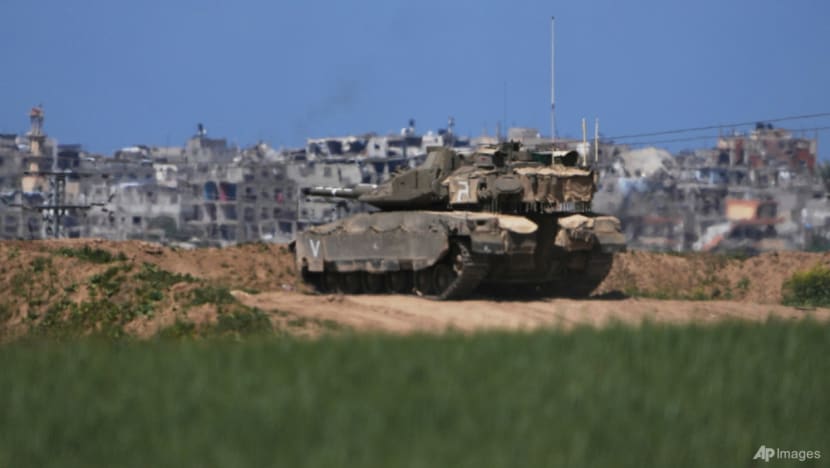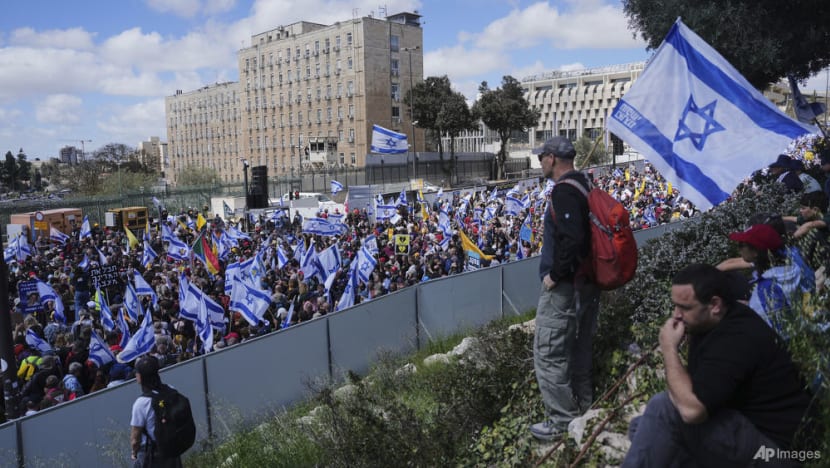Why is Israel intensifying its attacks on Gaza after two months of ceasefire? Analysts weigh in
Israel announced a new ground offensive in Gaza on Wednesday (Mar 19), shortly after breaking a ceasefire by launching airstrikes in the Palestinian enclave.

An Israeli tank takes position on the Gaza Strip border in southern Israel, Wednesday, March 19, 2025. (AP Photo/Ariel Schalit)

This audio is generated by an AI tool.
A ceasefire deal between Israel and Hamas that took effect in January held on shakily for several weeks after both sides failed to negotiate an extension when the first phase of the truce expired on Mar 1.
This relative peace, however, came to a halt when Israel resumed its strikes on Gaza on Tuesday (Mar 18), which the Hamas-run health ministry said killed over 400 people and left more than 500 injured.
Israel then announced renewed ground operations in the Palestinian enclave on Wednesday and issued a “last warning”, calling for the return of the remaining hostages.
Israeli Prime Minister Benjamin Netanyahu said he ordered the strikes due to a lack of progress in negotiations to extend the ceasefire.
Analysts pointed to various factors behind the timing of Israel’s renewed offensive, as momentum for talks grind to a standstill.
“By targeting (its strikes) just at the time of the Ramadan pre-dawn meal, (Israel) knew there would be certain people in certain places,” said Daniel Levy, president of independent policy institute the US/Middle East Project.
“I’m sure they also could anticipate there would be a very high civilian toll and could certainly anticipate the way this would play out across much of the Muslim world … at this time in the calendar year,” added Levy, who is also a former Israeli peace negotiator.
Muslims around the world, including in Gaza, marked the start of the holy month of Ramadan in the beginning of March.
DOMESTIC FACTORS
Eyal Mayroz, a senior lecturer of peace and conflict studies at the University of Sydney, said internal turmoil in Israel has played a part as well.
He noted that the Israeli government is under pressure by the public, with mass demonstrations breaking out on the streets of Jerusalem over Netanyahu’s move to oust Ronen Bar, the chief of the Shin Bet internal security agency.
Both men have been engaged in a public tiff over who bears responsibility for the Oct 7, 2023 attack by Palestinian militant group Hamas that sparked the current war.
According to Israeli media reports, Shin Bet is also investigating allegations that Netanyahu’s senior aides received substantial payments from entities linked to Qatar, which has been a key mediator in the ceasefire talks.

“Another (factor) is the desire by Netanyahu to feed into the demands of the extremist elements in his government as to not stopping the war, but continuing,” Mayroz told CNA938.
Levy also noted that Netanyahu managed to fortify his ruling coalition with his renewed strikes on Gaza.
The Israeli prime minister has less than two weeks to pass the 2025 state budget. If Israel’s parliament does not approve it by Mar 31, the government will automatically be dissolved and the country will hold early elections.
The far-right Religious Zionism party has repeatedly threatened to leave Netanyahu’s coalition if Israel agreed to the second phase of the ceasefire.
Itamar Ben Gvir, a far-right minister, also rejoined Netanyahu’s government on Wednesday in support of the return to fighting.
Now, the coalition will continue commanding a parliamentary majority and be able to meet the budget deadline.
Levy told CNA’s Asia First: “(We have to) see it through the lens – not so much of what brings security or what brings the Israeli hostages home – but what works for the personal political calculation of a prime minister who needs to keep a coalition going, and to set out his store as the indispensable wartime leader in that respect.
“By conducting this strike, he strengthened his coalition, and a lot of his immediate political problems evaporated.”
HOW THE AMERICANS ARE INVOLVED
Mayroz said the United States also played an important role in enabling the resumption of conflict in the embattled enclave.
He noted: “(US President Donald) Trump started off well by instigating this first phase, but it seems like his desire for a Nobel Peace Prize is waning because he's already taking on the Houthis in Yemen … and gave the green light for Israel to restart the war in Gaza.”
He was referring to the several waves of attacks the US launched against the Houthi movement’s strongholds in Yemen this month, in response to the group’s threats to international shipping.
Levy said Netanyahu had assessed his room for manoeuvre with the Trump administration before deciding to act.
According to the White House, Israel informed the US about Tuesday’s attack on Gaza before it happened.
Levy pointed out that the Trump administration made Netanyahu “nervous enough at the very outset” that he agreed to the terms of a ceasefire which he had rejected for months.
Under the more difficult second phase, both sides were supposed to establish a permanent ceasefire, with remaining living hostages in Gaza exchanged for more Palestinian prisoners. Israeli forces would also need to withdraw its troops from the enclave.
But negotiations stalled. Israel then blocked the entry of aid trucks into Gaza, after backing a new proposal by the US for a temporary ceasefire during the Ramadan and Passover periods.
“For now, the US is aligned with Israel’s shifting of the goal posts,” said Levy.
Mayroz said the Americans “hold the key” as they are “the only ones to stop Netanyahu’s launch back into war and support the Israeli public that doesn’t want to go back into war”.
Thousands protested outside Netanyahu’s office on Wednesday, calling for the return of hostages and the safeguarding of democracy.
“A lot of (Israel’s) reservists who are supposed to be part of any kind of future ground assault are saying that they will refuse to go back in because this is not helping the release of the hostages,” Mayroz said.
“But again, all the cards are in the hands of Trump - and at the moment, he seems to be supporting Israeli violence side by side with his own (agenda) against the Houthis in Yemen.”

















